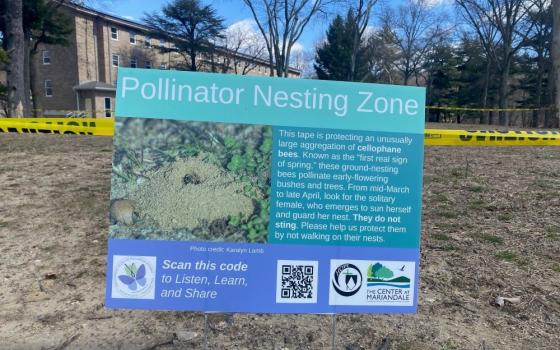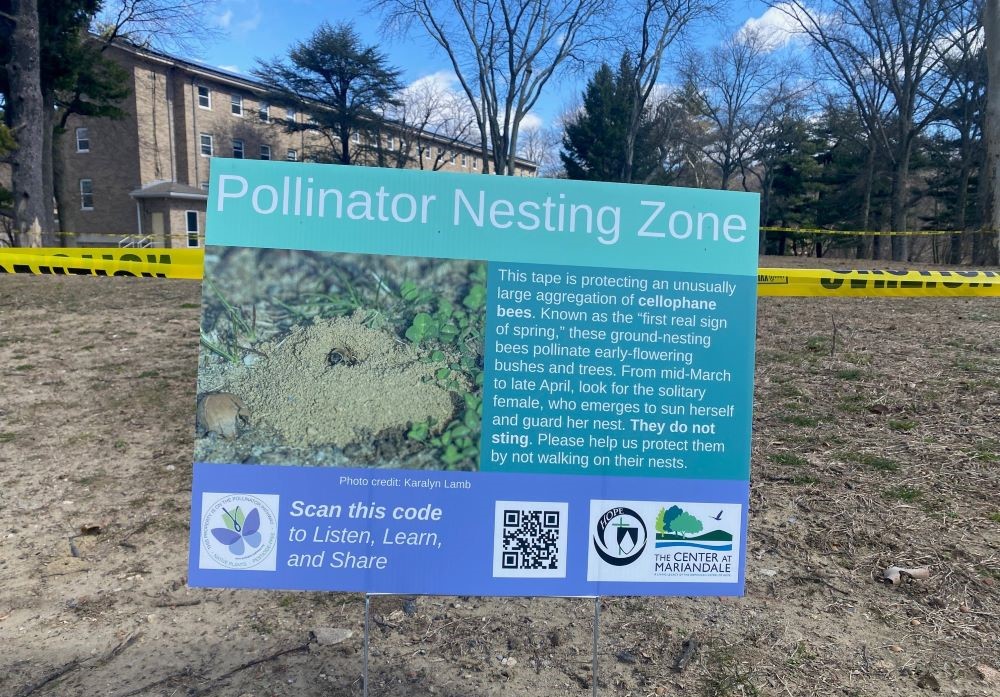
When large populations of cellophane bees nest in Mariandale, New York, in the early spring, the Dominican Sisters of Hope cordon off restricted "pollinator nesting zones" to protect the bees and post signs to educate the public. Cellophane bees are prolific fruit tree pollinators. (Courtesy of Dominican Sisters of Hope)
The Dominican Sisters of Hope in the Hudson Valley and the Sisters of St. Joseph of Brentwood on Long Island are among the first 34 organizations to receive grants from New York's inaugural Pollinator Conservation Fund to combat declining pollinator populations across the United States in recent years.
"Pollinators are the unsung heroes of our environment, yet their very existence has been threatened by the harmful impacts of pesticides, habitat destruction and climate change," said New York Attorney General Letitia James in a press release for the grant.
In 2022, the state's Department of Environmental Conservation published a multiyear survey of New York's pollinator species, which found that 38% to 60% of the state's native insect pollinators are at risk of going extinct.
Pesticide use is among the biggest threats to pollinators.
Aimée Codee, director of the Xerces Society for Invertebrate Conservation's pesticide program, said historically pesticide regulation has been difficult to address because many think pesticides are the only way to manage pests. At the individual level, it's what people reach for first when they've identified a pest problem in a yard, farm or park. At the legislative level, lawmakers fear negative consequences from regulating pesticides too tightly.
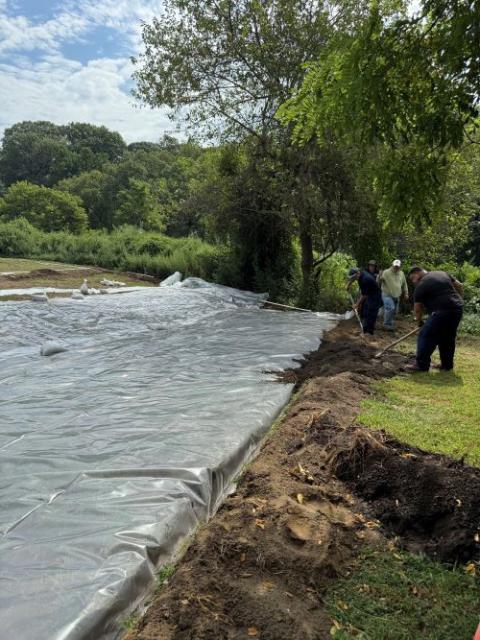
The Dominican Sisters of Hope are using solarization to manage an infestation of invasive mugwort without using herbicides or pesticides. (Courtesy of Dominican Sisters of Hope)
The U.S. Environmental Protection Agency's strategies for regulating pesticides are a point of frustration for conservationists like Codee. In regard to work related to the Endangered Species Act, Codee said EPA studies tend to be lengthy, yet don't account for certain pesticide uses like seed treatments or uses in urban areas. This leaves much of commercial insecticide use unconsidered and unevaluated for harmful effects.
"We're talking about hundreds of pages and years of work, but really it's a lot of noise and a lot of time," yet it doesn't result in much on-the-ground change, Codee said
State initiatives like the grant program, partially funded from a settlement between James and Bayer CropScience and Monsanto, allow local organizations to have that on-the-ground impact by foregoing pesticides and other practices that harm pollinators to create safe spaces for native pollinators to thrive.
How Catholic sisters use the grants
With this grant, the Sisters of Hope are turning a 5.5-acre meadow that's been taken over by invasive mugwort into a pollinator-friendly garden using pesticide-free techniques.
"We don't, especially during the active pollinator early pollinator seasons, we don't mow our grass down. We've let a substantial portion of a property revert to a natural meadow," said Robert Krebs, director of development at the Dominican Sisters of Hope, which manages 61 acres of land in the mid-Hudson Valley.
Alongside a process called solarization, which will essentially "cook" the mugwort by trapping moisture and heat in the soil using temporary plastic sheets, they'll also recruit the help of goats to tackle the problem on slopes alongside the river banks.
"The goats play a great role because they eat invasives, they actually like the invasives, of course, they can be in areas that are slopes, and where goats can walk and we can't easily," Krebs said.
Once that's done, the goal is to restore the meadow with flowering plants that support a variety of pollinators, including "moths and butterflies, hummingbirds, other types of birds that are pollinators, [and] bats."
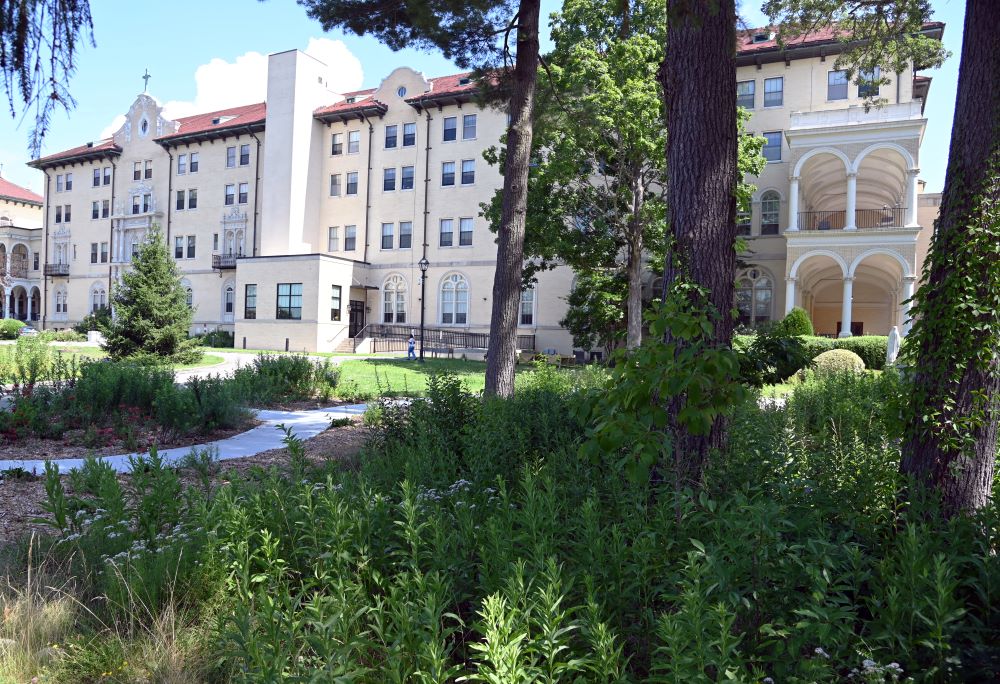
A garden stands at the entrance to the Sisters of St. Joseph's convent in Brentwood, New York. On their 211-acre campus, the sisters are making their gardens more hospitable to pollinators by making it easier for small creatures to navigate between them. (Courtesy of Heather Coste)
On their 211-acre campus in Brentwood, the Sisters of St. Joseph are making their gardens more hospitable to pollinators by making it easier for small creatures to navigate between them.
"As a human, I can stand there, I can see maybe three gardens from a point that I'm at on the landscape," said Heather Coste, director of ecological sustainability for the Sisters of St. Joseph at Brentwood. "But if I come down to the size of a sweat bee, if I'm in one garden, can I see the next garden? Do I know where I'm going?"
They're also intentional about introducing plants to support specialist pollinators, which rely on specific plants to survive.
"Some pollinators are generalists, so they can go to just about anything that's blooming at any given time, but there are a number of pollinators that are specialist pollinators," Coste said. "Some of those are the most at risk — especially on Long Island — for habitat loss."
The grant also will help fund Coste's four-person team, which for the past five years has handled daily tasks like removing invasive species, maintaining gardens and community outreach.
Laudato Si' and land conservation
While the New York grant has helped these sisters launch projects and support daily operations, both groups began their environmental conservation work long ago.
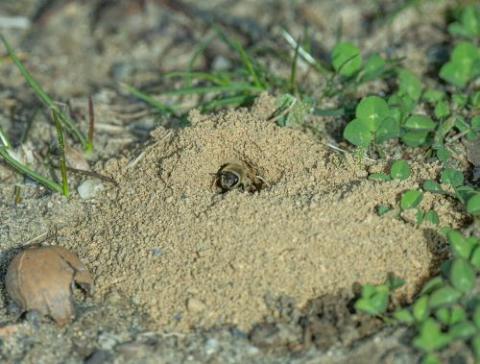
A cellophane bee emerges from the ground in Mariandale, New York. A survey found that 38% to 60% of the state's native insect pollinators are at risk of going extinct. (Courtesy of Dominican Sisters of Hope/Karalyn Lamb)
For the Sisters of St. Joseph, it's a core part of their charism to care for "the dear neighbor" — a label that's not limited to people, but includes all of creation.
"If it's not for that dear neighbor, we're not going to have the food supply, we're not going to be able to have, to breathe the air that we have around us," said Sr. Karen Burke, former director of the sisters' sustainability department. "So, it was really widening that definition of the dear neighbor."
Burke, who laid the groundwork for Coste's team, said while the campus was originally established in 1896 with a focus on education and spirituality for sisters, the congregation in 2015 affirmed a land ethic statement to care for their property more intentionally with the community and future generations in mind.
Laudato Si' was published just a few months later.
"Pope Francis' message in Laudato Si' was the clear message that part of our spirituality and our Catholic calling, the gospel message, is balancing our communal needs and the needs of Earth both now and into the future," she said. "And I think it's a way that we are living out the Gospel message."
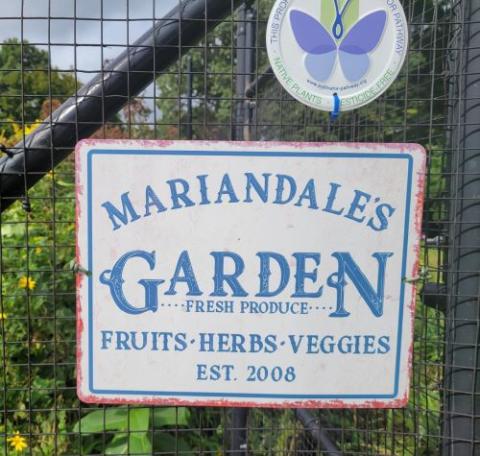
In 2018, the Dominican Sisters of Hope unanimously approved a land conservation easement so part of their land would never be developed. (Courtesy of Dominican Sisters of Hope)
For the Dominican Sisters of Hope, care for creation is also a core value. In 2018, they unanimously approved a land conservation easement so part of their land would never be developed. They even kept beehives in the past after having a local ordinance changed to permit beehives in the area. But their understanding and implementation of care for creation has also evolved over time, in part thanks to Francis' encyclical.
"It's things that we attempted to do, but because our consciousness was raised with the issue of Laudato Si' 10 years ago, that made it a more conscious effort on our part," said Sr. Margaret Anderson. "It was something that we had always believed in."
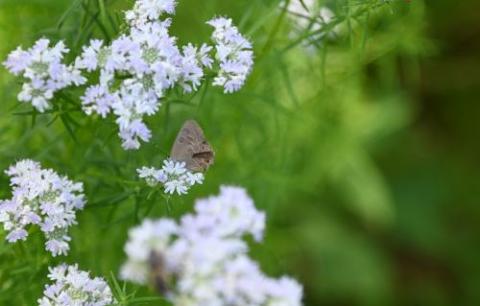
A butterfly rests on a flowering plant at the Sisters of St. Joseph property. (Courtesy of Heather Coste)
The congregation has also fostered relationships and dialogue with Indigenous groups. Three Lenape tribes they recently hosted helped them better understand land injustice and nature's role on their land.
"I think that Laudato Si' certainly expanded Catholic social teaching, and into an action plan that all could implement," said Sr. Patricia Magee, prioress of the Dominican Sisters of Hope. "It wasn't just for Catholics — it was for all."
Community outreach
The impact of their pollinator conservation work doesn't end on campus — it extends into the local community, too.
One of the Dominicans' gardens creates donations to a local food pantry. They donated hundreds of pounds of produce from that garden last year, Magee and Anderson said. Campus ministry groups who participate in their immersion program at the retreat center help in the garden and the food pantry, they said.
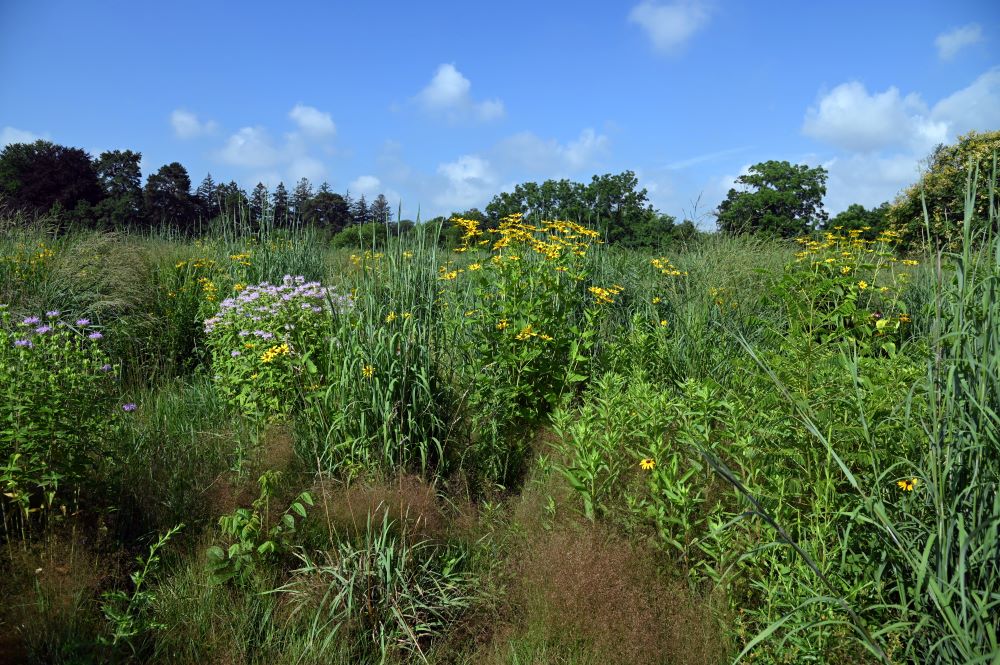
The Sisters of St. Joseph transformed their 8-acre meadow from a grass lawn to this garden as part of their environmental initiatives. (Courtesy of Heather Coste)
More recently, through a separate grant, they've hosted fifth and sixth graders for screen-free nature retreats.
"It's intentional at that age," Magee said. "They'll be coming home and telling their parents about it, so that it's an opportunity to share the learning at home."
On the Sisters of St. Joseph's Long Island campus, community engagement involves inviting local residents for informative tours or hands-on, educational programming to engage in pollinator conservation work. This fall, they're planning a volunteer event where people can remove invasive plant species and seed native ones to grow in their place.
Coste hopes these kinds of events demonstrate to New Yorkers what's possible without the use of pesticides. They hope people get inspired to take steps toward introducing native, pollinator-friendly plants to their own yards.
"One of the things we're trying to do here when we're doing our tours, when we're doing outreach is try to help people understand that some is still better than none, and you don't have to be perfect at it to start creating better habitats," Coste said.
Hope for local regulation
The Trump administration has been lax toward pesticide regulation in the past and has opposed other environmental regulations. In Trump's first term, the U.S. Fish and Wildlife Service reversed a ban on the use of neonicotinoid pesticides, which are especially harmful to bees, on wildlife refuges.
Advertisement
The EPA began layoffs in its research and development office in July and announced it would begin taking steps toward deregulating many contributors to climate change, mostly related to energy, in March.
The goal of these deregulatory actions is to "unleash American energy, lower costs for Americans, [and] revitalize the American auto industry," according to EPA Administrator Lee Zeldin. While pesticide deregulation isn't specifically mentioned in his 31 steps toward deregulation, the agency has "expedited review processes for new chemicals and pesticides," Zeldin wrote in an op-ed for The Hill.
Codee said her hope for more effective pesticide regulation doesn't lie in the administration or in Congress. Pesticide regulation is a difficult issue to address regardless of national leadership.
She is hopeful that "the state governments, the local governments who want to make a change where they are and want to address risks that have not yet to date been addressed at the federal level" can do so.




